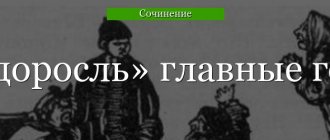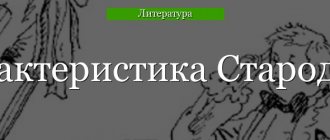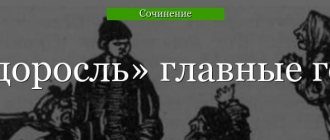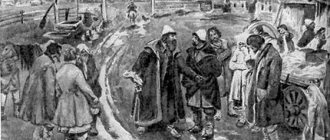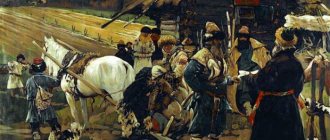1) Name the “talking names” in the comedy “Minor.” What are the main properties of the characters expressed by Fonvizin through their surnames? 2) What is the meaning of Starodum’s last remark? Why do the comedy “Minor” end with these words? 3) How are Mitrofanushka’s teachers portrayed in the comedy “The Minor”?? What ideas do these images represent? URGENTLY, HELP PLEASE))))
Questions about the comedy “The Minor”
1) prove that the comedy “minor” belongs to the works of classicism. 2) Who is to blame for the fact that it was not Mitrofan who grew up, but Mitrofanushka? 3) Why does this comedy and its content remain relevant to this day?
1. The genre of “The Tale of Igor’s Campaign” is:
1) life; 2) a military story; 3) word; 4) chronicle?
2. Which principle is “superfluous” for classicism:
1) unity of place; 2) unity of time; 3) unity of action; 4) unity of language?
4. The line “The abyss has opened, it’s full of stars...” belongs to:
1) Fonvizin; 2) Trediakovsky; 3) Sumarokov; 4) Lomonosov?
5. Match the works and literary movements:
A) “Poor Lisa”; b) “Felitsa”; Vasya"; r) "Svetlana".
6. In which literary movement was a peaceful, idyllic life in the lap of nature depicted as an ideal:
7. In which work is “The Tale of Lomonosov” included:
1) “Journey from St. Petersburg to Moscow” by A.N. Radishcheva; 2) “Monument” GR. Derzhavina; 3) “History of the Russian State” N.M. Karamzin; 4) “The Captain’s Daughter” by A.S. Pushkin?
8. Which characteristic does not apply to romanticism:
Division of genres into high and low; the contradiction between ideal and reality; desire for freedom; conflict between the individual and society? 9. What genre of literary movement is elegy:
10. Which of the heroes of A. S. Griboedov’s comedy “Woe from Wit” owns the phrase: “He fell painfully, but got up well”:
1) Lisa; 2) Chatsky; 3) Famusov; 4) Sophia?
11. Who wrote that in the comedy “Woe from Wit” by A.S. Griboedov, “there are 25 fools for one sane person and this person, of course, is in conflict with society, his
To those around you":
1) IA. Goncharov; 2) A.S. Griboyedov; 3) A.S. Pushkin; 4) V.G. Belinsky.
1) G.R. Derzhavina; 2) N.M. Karamzin; 3) V.A. Zhukovsky; 4) A.N. Radishcheva?
13. From which country did the hero of A. S. Pushkin’s novel “Eugene Onegin” Vladimir Lensky return to his estate:
1) Germany; 2) Italy; 3} England; 4) France?
In what poetic meter is the novel written by A.S. Pushkin “Eugene Onegin”: 1) anapest; 2) trochee; 3) dactyl; 4) iambic? What was the name of the estate where M.Yu. Lermontov spent his childhood? 1) Lermontov; 2) Tarkhany; 3) Boldino; 4) Streshnevo? 16. Which story from the components of the novel by M.Yu. Lermontov's "Hero of Our Time" is the last in chronological terms:
1) “Bela”; 2) “Maksim Maksimych”; 3) “Fatalist”; 4) “Princess Mary”?
17. Which epigraph was taken by N.V. Gogol for the comedy “The Inspector General”: 1) “Oh rus... Oh Rus'!”;
“Take care of your dress again, but take care of your honor from a young age*” “There’s no point in blaming the mirror if your face is crooked”; “And the smoke of the fatherland is sweet and pleasant to us”? 18. Which work is not included in the St. Petersburg stories of N.V. Gogol:
1) “Portrait”; 2) “Marriage”; 3) “Overcoat”; 4), "Stroller"?
19. Match the names of the works and their authors:
“You can’t understand Russia with your mind...”; "Poet and Citizen"; “No, I’m not Byron...”; “I came to you with greetings...”; a) M.Yu. Lermontov; b) Full name Tyutchev; c) N.A. Nekrasov; d) A.A. Fet.
What was the name of the heroine of the story by I.S. Turgenev “First Love”: 1) Anastasia; 2) Zinaida; 3) Elena; 4) Tatyana? Which writer was called “Columbus of Zamoskvorechye”: 1) A.P. Chekhov; 2) N.V. Gogol; 3) A.N. Ostrovsky; 4) I.S. Turgenev?
22. As determined by FA/. Dostoevsky genre of “White Nights”:
Which work is “extra” for A.P. Chekhov’s “little trilogy”: 1) “Gooseberry”; 2) “Ionych”; 3) “About love”; 4) “Man in a Case”?
Fonvizin's contemporaries highly valued The Minor; he delighted them not only with his amazing language, the clarity of the author's civic position, and the innovation of form and content.
Features of the genre
According to the genre, this work is a classic comedy, it complies with the requirements of “three unities” inherent in classicism (place, time, action), the heroes are divided into positive and negative, each of the heroes has its own role (“reasoner”, “villain”, etc.). etc.), however, there are also deviations from the requirements of classicist aesthetics, and serious deviations. So, the comedy was only supposed to amuse, it could not be interpreted in multiple meanings, there could be no ambiguity in it - and if we remember “The Minor”, then we cannot help but admit that, raising in the work the most important social issues of his time, the author resolves them by means far from comic: for example, at the end of the work, when, it would seem, “vice is punished,” the viewer cannot help but sympathize with Mrs. Prostakova, who is rudely and cruelly pushed away by the ungrateful Mitrofanushka, preoccupied with her own fate: “Let go, mother, how you imposed yourself... “- and the tragic element powerfully invades the comedy, which was unacceptable.. And with the “unity of action” everything is also not so simple in comedy, it has too many storylines that do not “work” in any way to resolve the main conflict, but create a broad social background that determines the characters of the characters. Finally, Fonvizin’s innovation was reflected in the language of the comedy “The Minor”; the speech of the characters is very highly individualized, it contains folklorisms, vernacular, and high style (Starodum, Pravdin), which also violates the classic canons of creating speech characteristics of characters. We can, summing up, conclude that Fonvizin’s comedy “The Minor” became a truly innovative work for its time; the author pushed the boundaries of the aesthetics of classicism, subordinating it to the solution of the task set for himself: to angrily ridicule the vices of his contemporary society, to rid it of “evil morals.” ", capable of destroying both the human soul and public morality.
Genre of the work
COMEDY is a type of drama in which the moment of effective conflict is specifically resolved. It has a number of signs:
- does not entail the death of one representative of the warring parties;
- aimed at “nothing” goals;
- the narrative is lively and vivid.
Also in Fonvizin’s work, a satirical orientation is obvious. This means that the author set himself the task of ridiculing social vices. This is an attempt to veil life's problems under the guise of a smile.
“Minor” is a work built according to the laws of classicism. One storyline, one location, and all events take place within 24 hours. However, this concept is also consistent with realism, as evidenced by individual objects and places of action. In addition, the characters are very reminiscent of real landowners from the outback, ridiculed and condemned by the playwright. Fonvizin added something new to classicism - merciless and sharp humor.
Image system
Let us analyze the system of images of the comedy “The Minor”, which, as required by the aesthetics of classicism, represents two directly opposite “camps” - positive and negative heroes. Here you can also notice a certain deviation from the canons; it manifests itself in the fact that it carries duality; it is almost impossible to classify them as purely positive or purely negative heroes. Let us remember one of Mitrofanushka’s teachers, Kuteikin. On the one hand, he suffers humiliation from Mrs. Prostakova and his student, on the other hand, he is not averse, if the opportunity arises, to “snatch his piece,” for which he is ridiculed. Or “Mitrofan’s mother” Eremeevna: she is reviled and humiliated by her mistress in every possible way, she humbly endures, but, forgetting herself, rushes to protect Mitrofanushka from her uncle, and does this not only out of fear of punishment...
Construction of comedy
The play has such a structure that readers are introduced to the main characters at the very beginning. The composition of “Undergrowth” is as follows:
- The beginning. Everyone will know about Sophia's rich dowry. The fight for her hand begins.
- Development of action. The tension gradually increases in many episodes.
- Climax. Prostakova decides to kidnap Sophia and forcefully marry Mitrofan.
- Denouement. The kidnapping fails. Sophia and Milon leave, Mitrofanushka joins the army, the Prostakovs’ property is arrested.
The image of Prostakova in the comedy “Minor”
As already noted, Fonvizin innovatively portrays his main character, Mrs. Prostakova. From the very first scenes of the comedy, we are faced with a despot who does not want to take anyone or anything into account. She rudely imposes her will on everyone, suppresses and humiliates not only the serfs, but also her husband (how can one not recall Mitrofan’s “dream in hand” about how “mother” beats “father”?..), she tyrannizes Sophia, she wants to force her to marry first her brother Taras Skotinin, and then, when it turns out that Sophia is now a rich bride, her son. Being herself an ignorant and uncultured person (with what pride she declares: “Read it yourself! No, madam, I, thank God, was not brought up like that. I can receive letters, but I always order someone else to read them”!), she despises education, although he tries to teach his son, he does this only because he wants to ensure his future, and what is Mitrofan’s “training” worth, as it is presented in the comedy? True, his mother is convinced: “Believe me, father, that, of course, it’s nonsense that Mitrofanushka doesn’t know”...
Mrs. Prostakova is characterized by cunning and resourcefulness, she stubbornly stands her ground and is convinced that “we will take ours” - and is ready to commit a crime, kidnap Sophia and, against her will, marry her to a man from the “Skotinin family.” When she meets resistance, she simultaneously tries to beg for forgiveness and promises punishment to those of her people, due to whose oversight the “enterprise” failed, in which Mitrofanushka is ready to actively support her: “Take it for people?” The “transformation” of Mrs. Prostakova, who had just humbly begged on her knees to forgive her, and, having received the petition, “jumped up from her knees,” fervently promises: “Well! Now I will give the dawn to my people. Now I'll go through everyone one by one. Now I’ll find out who let her go. No, scammers! No, thieves! I won’t forgive a century, I won’t forgive this ridicule.” There is so much voluptuousness in this triple “now”, and how truly scary it becomes from her request: “Give me at least three days (Aside) I would make myself known...”.
However, as already noted, there is a certain duality in the image of Prostakova. She deeply and devotedly loves her son and is ready to do anything for him. Is she guilty of comparing her love for him to a dog’s love for puppies: “Have you ever heard of a bitch giving away her puppies?”? We must not forget that she is from the Skotinin-Priplodin family, where such half-animal love was the only possible one, how could she be different? So she disfigures Mitrofan’s soul with her blind love, her son pleases her in every possible way, and she is happy that he “loves” her... Until he throws her away from him, because now he doesn’t need her, and even those people who just condemned Mrs. Prostakova sympathize with her in her maternal grief...
Collection of ideal social studies essays
Comedy D.I. Fonvizin's "Minor" is rightfully considered one of the best works of the great writer. In it, the author showed innovation, creating the first socio-political work in Russian literature, touching on issues of morality and education.
According to Gogol, Fonvizin in his comedy revealed “the wounds and illnesses of our society, severe internal abuses, which, by the merciless power of irony, are exposed in stunning evidence.” In the work, the landowners' estate turns into a public platform. The author publicly ridicules the vices of Prostakov and Skotinin, who are the main negative characters of the work. The images of these heroes contain all the worst qualities of the human soul. Rudeness and cruelty coexist with ignorance and stupidity, which gives rise to the concept of “malicious ignoramuses.”
The image of Mrs. Prostakova is one of the most striking in comedy. It is through him that the author embodies the idea of tyranny, widespread in feudal Russia. Prostakova appears as a rude and domineering landowner, in whose hands all the power in the house is concentrated. The heroine is extremely cruel to her peasants and servants, which is clear from the very beginning of the work. Even at the outset of the comedy, Prostakova insults the tailor Trishka with the rudest words, calling him a “thief’s mug,” a “thief,” and a “swindler.” In addition, the heroine treats Eremeevna, the nanny of her son Mitrofan, terribly. The nurse, devoted to her masters, instead of a well-deserved reward, receives only “five rubles per year, and five slaps per day.” Prostakova's relationship with the servants reveals her evil and cruel character, which also falls with destructive force on her household. Thus, the heroine keeps her husband in fear and treats her niece Sophia with extreme disrespect and rudeness. Her only “joy” is her son Mitrofanushka, who takes over his mother’s evil disposition. Prostakova does everything solely for the sake of herself and her son. She even decides to kidnap Sophia in order to forcefully marry her to Mitrofan and receive her rich inheritance. All of Prostakova’s actions are permeated with cruelty and selfishness, which expresses the author’s definition of “evil morality.”
However, rudeness and hypocrisy are not the only negative traits of Prostakova. Using the example of the heroine, Fonvizin reveals the problem of ignorance of Russian landowners. So, Prostakova is absolutely illiterate, which is manifested in the episode where she asks to read a letter from Starodum. The heroine is not ashamed of her lack of education, because she does not consider education important. She instills a similar attitude towards learning in her son. She hires teachers “for show,” and she teaches Mitrofan her philosophy of life: “If you find the money, don’t share it with anyone. Take everything for yourself, Mitrofanushka.” Thus, we see that Prostakova is a vivid illustration of the problem of education. She not only does not hide her ignorance, but also
Image of Mitrofan
The image of Mitrofan was also created by Fonvizin in a non-traditional way. The “minor” who likes to be “small”, who diligently takes advantage of his mother’s attitude towards him, is not as simple and stupid as it might seem at first glance. He has learned to use his parents' love for himself for his own benefit, he knows well how to achieve his goal, he is convinced that he has the right to everything he wants. Mitrofanushka’s selfishness is the driving force behind his actions, but the hero also has cruelty (remember his remark about “people”), resourcefulness (what is his discussion about the “door”), and lordly contempt for people, including his mother, from whom he, on occasion, seeks help and protection. And his attitude towards education is so dismissive only because he does not see any real benefit from it. Probably, when he “serves”, he - if it is beneficial - will change his attitude towards education, potentially he is ready for anything: “For me, where they tell me.” Consequently, the image of Mitrofan in the comedy “The Minor” is also characterized by a certain psychologism, as is the image of Prostakova, which is Fonvizin’s innovative approach to creating negative images that were only supposed to be “villains”.
What is the work about?
The plot of Denis Fonvizin’s comedy “The Minor” revolves around a family of landowners who are completely mired in immorality and tyranny. Children became like their rude and narrow-minded parents, and their sense of morality suffered as a result. Sixteen-year-old Mitrofanushka is trying his best to finish his studies, but he lacks the desire and ability. The mother looks at this carelessly, she does not care whether her son will develop. She prefers that everything remain as it is; any progress is alien to her.
The Prostakovs “sheltered” a distant relative, the orphan Sophia, who differs from the rest of the family not only in her outlook on life, but also in her good manners. Sophia is the heiress of a large estate, which Mitrofanushka’s uncle, Skotinin, who is a great hunter, “looks” at. Marriage is the only available way to take over Sophia’s household, so the relatives around her are trying to persuade her into a profitable marriage.
Starodum, Sophia’s uncle, sends his niece a letter. Prostakova is terribly dissatisfied with this “trick” of her relative, who was considered dead in Siberia. The deceit and arrogance inherent in her nature is manifested in the accusation of a “deceptive” letter, supposedly “amorous”. Illiterate landowners will soon learn the true content of the message, resorting to the help of the guest Pravdin. He reveals to the whole family the truth about the Siberian inheritance he left, which gives him as much as ten thousand in annual income.
It was then that Prostakova came up with an idea - to marry Sophia to Mitrofanushka in order to appropriate the inheritance for herself. However, officer Milon, walking through the village with soldiers, “bursts” into her plans. He met with his old friend Pravdin, who, as it turned out, is a member of the vicegerental board. His plans include observing landowners mistreating their people.
Milon speaks of his long-standing love for a sweet person who was transported to an unknown place due to the death of a relative. Suddenly he meets Sophia - she is that same girl. The heroine talks about her future marriage to the undersized Mitrofanushka, from which the groom “flashes up” like a spark, but then gradually “weaken” with a detailed story about his “betrothed.”
Sophia's uncle has arrived. Having met Milon, he accepts Sophia’s choice, while inquiring about the “correctness” of her decision. At the same time, the Prostakovs' estate was transferred to state custody due to cruel treatment of the peasants. Seeking support, the mother hugs Mitrofanushka. But the Son did not intend to be polite and polite, he was rude, causing the venerable matron to faint. Waking up, she laments: “I am completely lost.” And Starodum, pointing at her, says, “These are the fruits worthy of evil!”
Positive images
The playwright is more traditional in creating positive images. Each of them is an expression of a certain idea, and as part of the statement of this idea, an image-character is created. Almost positive images are devoid of individual traits; they are images-ideas inherent in classicism; Sophia, Milon, Starodum, Pravdin are not living people, but exponents of a “certain type of consciousness”; they represent a system of views that was advanced for their time on the relationship between spouses, the social structure, the essence of the human personality and human dignity.
Image of Starodum
During the time of Fonvizin, the image of Starodum in the comedy “Minor” aroused special sympathy among the audience. Already in the very “talking” surname of the character, the author emphasized the contrast between “the present century and the past century”: in Starodum they saw a man of the era of Peter I, when “In that century, courtiers were warriors, but warriors were not courtiers.” Starodum’s thoughts on education, on the ways in which a person can achieve fame and prosperity, about what a sovereign should be caused a warm response from a significant part of the audience who shared the progressive beliefs of the author of the comedy, while special sympathy for the image of the hero was caused by the fact that he did not just proclaim these progressive ideas - according to the play It turned out that with his own life he proved the correctness and advantage of such behavior for a person. The image of Starodum was the ideological center around which the positive heroes of the comedy united, opposing the dominance of the morality of the Skotinins and Prostakovs.
Education
D.I. Fonvizin affirms the idea that a person should be educated. However, education is not only learning with teachers, but also self-education, the desire to gain new knowledge. The author in the comedy “The Minor” demonstrates how Mitrofanushka studies with various teachers, but does not become educated because of this. Firstly, this is due to the fact that Mitrofan himself does not want to become smart by acquiring new knowledge. Secondly, the teachers with whom the hero studies are not educated people themselves. Teachers who themselves do not know anything about education are not able to teach anything to another person. Mitrofan's home education does not lead to anything good. For teachers, it was important to collect fees from parents; teaching itself took a back seat.
The problem of education becomes the basis of the conflict between the heroes. Each character has his own position regarding the education of the younger generation.
For Prostakova, education is just a way to get into high society. For this reason alone, she hires teachers for Mitrofan. For the hero, education becomes an external indicator of intelligence, despite the fact that Mitrofan is an illiterate person.
For Pravdin and Starodum, education is about broadening a person’s horizons, instilling in him moral qualities that will help a person live honestly and truthfully. Starodum gives instructions to Sophia, who listens carefully and remembers them.
Image of Pravdin
Pravdin, a government official, embodies the idea of statehood, which protects the interests of education and the people, which seeks to actively change life for the better. Guardianship of Prostakova's estate, which Pravdin appoints by the will of the empress, gives hope that the ruler of Russia is able to stand up for the protection of those of her subjects who most need this protection, and the determination with which Pravdin carries out the reforms should have convinced the viewer, that the highest authorities are interested in improving the lives of the people. But how then can we understand Starodum’s words in response to Pravdin’s call to serve at court: “It is in vain to call a doctor to the sick without healing”? It is likely that behind Pravdin stood the System, which confirmed its reluctance and inability to carry out real reforms, and Starodum represented himself, an individual person, in the play, and explained why the image of Starodum was perceived by the audience with much more sympathy than the image of the “ideal official” .
Milon and Sophia
The love story of Milon and Sophia is a typically classic love story of two noble heroes, each of whom is distinguished by high moral qualities, which is why their relationship looks so artificial, although, against the backdrop of Skotinin’s attitude towards the same Sophia (“You are my dear friend! If now, without seeing anything, I have a special peck for each pig, then I’ll find a little one for my wife”) she really is an example of the high feeling of moral, educated, worthy young people, contrasted with the “fertility” of negative heroes.
The meaning of the comedy "The Minor"
Pushkin called Fonvizin “a brave ruler of satire,” and the comedy “Minor,” which we analyzed, fully confirms this assessment of the writer’s work. In it, Fonvizin’s author’s position is expressed quite unambiguously, the writer defends the ideas of enlightened absolutism, he does this with extreme talent, creating convincing artistic images, significantly expanding the scope of the aesthetics of classicism, taking an innovative approach to the plot of the work, to the creation of character images, some of which are not It simply represents the expression of certain socio-political ideas, but has a pronounced psychological individuality and expresses the inconsistency of human nature. All this explains the enormous importance of Fonvizin’s work and the comedy “Nedorosl” for Russian literature of the 18th century, the success of the work among his contemporaries and its significant influence on the subsequent development of Russian drama.
Civil position.
In recent years, standing at the helm of the writers' organization, Alexander Fadeev implemented repressive decisions of the party and government in relation to his colleagues: Zoshchenko, Akhmatova, Platonov. In 1946, after the historical decree of Zhdanov, which actually destroyed Zoshchenko and Akhmatova as writers, Fadeev was among those who carried out this sentence. In 1949, Alexander Fadeev became one of the authors of a programmatic editorial in the organ of the CPSU Central Committee, the newspaper Pravda, entitled “On an anti-patriotic group of theater critics.” This article marked the beginning of a campaign that became known as the "Fight Against Cosmopolitanism." But in 1948, he tried to allocate a significant amount from the funds of the Union of Writers of the USSR for Mikhail Zoshchenko, who was left penniless. Fadeev showed sincere participation and support in the fate of many writers disliked by the authorities: Pasternak, Zabolotsky, Gumilyov, several times he quietly transferred money for the treatment of Andrei Platonov to his wife. Having a hard time experiencing such a split, he suffered from insomnia and fell into depression. In recent years, Fadeev became addicted to alcohol and went on long binges. Ilya Erenburg wrote about him: Fadeev was a brave but disciplined soldier, he never forgot about the prerogatives of the commander-in-chief. Fadeev did not accept the Khrushchev thaw. In 1956, from the rostrum of the 20th Congress, the activities of the leader of Soviet writers were subjected to severe criticism by Mikhail Sholokhov. Fadeev was not elected a member, but only a candidate member of the CPSU Central Committee. Fadeev was directly called one of the perpetrators of repression among Soviet writers. After the 20th Congress, Fadeev’s conflict with his conscience escalated to the limit. He confessed to his old friend Yuri Libedinsky: “My conscience torments me. It’s hard to live, Yura, with bloody hands.” Slide 8
from the presentation
“Biography of Fadeev”
. The size of the archive with the presentation is 654 KB.
U-F
summary of other presentations
of “Works of Uspensky” - Guarantee men. Crocodile Gena and his friends. Interesting books. Uncle Fedor. Lectures by Professor Chainikov. Year of the good child. Eduard Nikolaevich Uspensky. Works of Eduard Nikolaevich Uspensky. A story about the work of the seaport. Uspensky's first book. Children's prose writer. Uncle Fyodor goes to school. Underwater berets. Fur boarding school. About Vera and Anfisa.
“Questions about Fonvizin’s “Minor”” - Aphorism. Speakers. Prostakova. Find and write down a word from this replica. Classicism. Comedy. Vralman. Tsyfirkin. What term refers to the characters' form of speech? The ideas of what era are promoted in the comedy “The Minor.” Mitrofan. Indicate the surname of the heroine of the play by D. I. Fonvizin. Minor. Skotinin. Which of the characters in the play expresses the author’s assessment of events in the finale?
“Uspensky” - Uspensky is a playwright. Uspensky is a poet. The work of a writer helps you children not only gain interest. Awards and prizes. Always in a creative search for adventure. Children's prose writer. Uspensky is a screenwriter. Quiz. Eduard Nikolaevich Uspensky was born on December 22, 1937. Eduard Nikolaevich Uspensky did a lot for children. An incident “rescued” the schoolboy Uspensky. Uspensky. Uspensky's characters.
“Questions on “Minor”” - Main types of dramatic works. Test based on the work of D.I. Fonvizin “The Minor”. Generalization of knowledge on the comedy by D.I. Fonvizin “The Minor.” What Starodum says about education and enlightenment. Where does the comedy begin? Magic land. What is Skotinin’s cherished dream? For what purpose does Pravdin come to the village of Prostakovs? “Science in a corrupt man is a fierce weapon to do evil.” Who is the head of the Prostakov family?
"Wilde" - They brought the virok - two rocks of convict labor. Two fates have been held in the yaznitsi. Lord Alfred Douglas in childhood. Always cheerful, intelligent, with a great mind for learning. Edgar Allan Poe, Charles Baudelaire, and Stéphane Mallarmé have contributed to this creativity. Vice and Integrity are the material for your creativity. Marquis of Queensberry. Later, he went to America to give lectures on mysticism. He was the third son of the Marquis of Queensberry.
After the decree of Catherine II “On the freedom of the nobility,” the landowners became especially cruel and ignorant. In this regard, enlightened people begin to worry about the future of the country, since the principles of educating the nobility come down to ignorance and tyranny. From the current situation D.I. Fonvizin sees only one way out - a return to the ideas of enlightenment - goodness, honor and duty.
Prostakova's influence on raising her son
Prostakova has an undoubted influence on the development of her son Mitrofan. In translation, the name Mitrofan means “revealing his mother,” which fully reflects his image.
Prostakova, cruel to the serfs and members of her family, is guided in life only by her own desires. Such behavior destroys the remnants of dignity and respect in her. So Fonvizin is trying to convey to society that the lifestyle of the modern landed nobility is destructive.
This is how Mitrofan copies his mother’s behavior and the peculiarities of her communication with others. Without a shadow of a doubt, he mocks Eremeevna, treats his own parents with disdain, calling them rubbish.
Mitrofan's education
Mitrofan is spoiled, ignorant, lazy and selfish, he is only interested in his own entertainment, mental and physical labor is alien to him. The teachers hired to teach him are not able to give him real knowledge, but even the minimum that they give him, Mitrofan is not able to learn. Through the author’s laughter at the ignorance of the ignorant Mitrofanushka, we hear clear indignation and anxiety for the future of Russia - the future of the country will be based on such people.
Expression of the author's position on the issue of education
Fonvizin puts his own idea of raising the younger generation into the mouth of Starodum, who passes on his personal experience to his niece Sophia. It is in teaching the younger generation to the elders that Fonvizin sees the ideal of becoming the future arbiters of the destinies of his native state.
Starodum talks with the girl on a variety of topics - about the nobility of a nobleman, which is expressed in the number of good deeds he has performed, about wealth that needs to be shared with those who need it more than you. Family relationships, according to the hero, are built on the principle: the husband must obey reason, and the wife must obey her husband. And the main thing in life is to feel worthy of the blessings that you possess.
Upbringing
D.I. Fonvizin emphasizes that a person can become ambitious not only through education. The main thing that affects a person is parental education. If Prostakova did not see the point in education, it is not surprising that Mitrofan is indifferent and even negative towards studying. Mrs. Prostakova is Mitrofan’s main teacher. His father doesn't care about him at all. However, what his mother teaches Mitrofanushka does not contribute to the development of a moral personality. Prostakova is a tyrant and a tyrant, who contributes to the fact that loved ones constantly lie and lie.
At the end of the play it is clear that Mitrofan has absolutely no upbringing. He easily abandons his own mother, who loved him very much.
In the work, almost all the characters talk about the problem of education. The points of view of Prostakova and Skotinin are contrasted with the points of view of Starodum and Pravdin. The latter argue that a person must be educated in accordance with honor and dignity.




